Why Do Teenagers Sleep So Late?


Written and verified by the psychologist Sharon Capeluto
It’s 3:00 am, and while you’re on your fast asleep, your child still hasn’t batted an eye. Possibly, they’re surfing their social networks and interacting with their friends on their cell phone. Or perhaps they’re binge-watching some popular new series. Why do teenagers sleep so late? Keep reading to learn more about it.
The first thing you need to know is that they don’t sleep late to annoy you and make you lose your patience when you try to get them up for school the next morning. Nor do they do it out of laziness, irresponsibility, or rebelliousness. Rather, they sleep late because their biology tells them to.
Sleep in adolescence
Sleep is an essential physiological need, as a specific quantity and quality of sleep is required to satisfy the need for rest. We all know that we need to sleep for our body and mind to function properly. However, not all people need the same amount of sleep. Although there are certain parameters, the truth is that there’s no universal and determining answer in this aspect.
In fact, the recommended rest time varies considerably depending on the age of the person. In particular, newborn babies sleep an average of 15 hours a day, while the ideal for people over 65 years of age is 7 to 8 hours of rest.

Find out why teenagers sleep so late
Most adolescents go to bed late and wake up late. The alarm clock ringing at 7:00 am becomes their worst nightmare. Therefore, it’s strange to see any young person waking up before noon on weekend days. Generally, they start their day off at lunchtime.
A study conducted in Colombia by the Neuroscience Research Group provides some conclusions in this regard. For example, it clarifies that during this stage of life, there’s a delay of approximately two hours in the onset of nighttime sleep and the time of awakening. This modification is explained by hormonal influences on melatonin secretion and the regulatory mechanisms of the sleep-wake cycle.
In line with this research, neuroeducator and biologist David Bueno explains that young people fall asleep late at night due to the maturation process that the pineal gland undergoes at this time of life. It should be taken into account that this brain structure plays a fundamental role in the modulation of sleep patterns and the circadian cycle.
The bond with other young people
We can’t forget the context in which adolescents are immersed. On the one hand, we know that this is the developmental stage of social activity par excellence. In this regard, the bond with peers takes center stage and impacts all aspects of life, including sleep, whether through face-to-face meetings or digital communication. At the same time, the desire of teenagers to feel included makes them sacrifice hours of sleep.
Love
Another factor that tends to greatly affect the sleep routine of adolescents is romantic love. Those who experience falling in love for the first time tend to experience more intense nights that may involve erotic, cognitive, and emotional components. The silence and darkness of the night invite them to feel, think, love, or cry intensely.

Technology
Finally, the plethora of technological devices that most young people have in their bedrooms intensifies the delay of bedtime. Entertainment through cell phones, tablets, and televisions or computers becomes limitless, which hinders satisfactory rest. Indiscriminate use of technology can result in negative consequences for mental health, in addition to the effects on sleep routine.
A multi-causal issue
To conclude, we understand that the fact that adolescents are awake at night can’t be explained by one single reason. On the contrary, there are neurobiological, contextual, and psychological aspects that contribute to this habit that often bothers adults. However, it’s essential to discard the idea that young people sleep until noon because they’re lazy or irresponsible.
The truth is that they’re often trying to adapt to a reality that differs from their needs. In fact, the biological needs of adolescence in relation to sleep contrast with the demands of schooling. High schools open their doors very early in the morning and force students to interrupt their rest in an artificial and inconvenient way.
It’s 3:00 am, and while you’re on your fast asleep, your child still hasn’t batted an eye. Possibly, they’re surfing their social networks and interacting with their friends on their cell phone. Or perhaps they’re binge-watching some popular new series. Why do teenagers sleep so late? Keep reading to learn more about it.
The first thing you need to know is that they don’t sleep late to annoy you and make you lose your patience when you try to get them up for school the next morning. Nor do they do it out of laziness, irresponsibility, or rebelliousness. Rather, they sleep late because their biology tells them to.
Sleep in adolescence
Sleep is an essential physiological need, as a specific quantity and quality of sleep is required to satisfy the need for rest. We all know that we need to sleep for our body and mind to function properly. However, not all people need the same amount of sleep. Although there are certain parameters, the truth is that there’s no universal and determining answer in this aspect.
In fact, the recommended rest time varies considerably depending on the age of the person. In particular, newborn babies sleep an average of 15 hours a day, while the ideal for people over 65 years of age is 7 to 8 hours of rest.

Find out why teenagers sleep so late
Most adolescents go to bed late and wake up late. The alarm clock ringing at 7:00 am becomes their worst nightmare. Therefore, it’s strange to see any young person waking up before noon on weekend days. Generally, they start their day off at lunchtime.
A study conducted in Colombia by the Neuroscience Research Group provides some conclusions in this regard. For example, it clarifies that during this stage of life, there’s a delay of approximately two hours in the onset of nighttime sleep and the time of awakening. This modification is explained by hormonal influences on melatonin secretion and the regulatory mechanisms of the sleep-wake cycle.
In line with this research, neuroeducator and biologist David Bueno explains that young people fall asleep late at night due to the maturation process that the pineal gland undergoes at this time of life. It should be taken into account that this brain structure plays a fundamental role in the modulation of sleep patterns and the circadian cycle.
The bond with other young people
We can’t forget the context in which adolescents are immersed. On the one hand, we know that this is the developmental stage of social activity par excellence. In this regard, the bond with peers takes center stage and impacts all aspects of life, including sleep, whether through face-to-face meetings or digital communication. At the same time, the desire of teenagers to feel included makes them sacrifice hours of sleep.
Love
Another factor that tends to greatly affect the sleep routine of adolescents is romantic love. Those who experience falling in love for the first time tend to experience more intense nights that may involve erotic, cognitive, and emotional components. The silence and darkness of the night invite them to feel, think, love, or cry intensely.

Technology
Finally, the plethora of technological devices that most young people have in their bedrooms intensifies the delay of bedtime. Entertainment through cell phones, tablets, and televisions or computers becomes limitless, which hinders satisfactory rest. Indiscriminate use of technology can result in negative consequences for mental health, in addition to the effects on sleep routine.
A multi-causal issue
To conclude, we understand that the fact that adolescents are awake at night can’t be explained by one single reason. On the contrary, there are neurobiological, contextual, and psychological aspects that contribute to this habit that often bothers adults. However, it’s essential to discard the idea that young people sleep until noon because they’re lazy or irresponsible.
The truth is that they’re often trying to adapt to a reality that differs from their needs. In fact, the biological needs of adolescence in relation to sleep contrast with the demands of schooling. High schools open their doors very early in the morning and force students to interrupt their rest in an artificial and inconvenient way.
All cited sources were thoroughly reviewed by our team to ensure their quality, reliability, currency, and validity. The bibliography of this article was considered reliable and of academic or scientific accuracy.
- Bueno, D. (2022). El cerebro del adolescente: Descubre cómo funciona para entenderlos y acompañarlos. Grijalbo.
- Talero, C., Durán, F., & Pérez, I. (2013). Sueño: características generales: Patrones fisiológicos y fisiopatológicos en la adolescencia. Revista Ciencias de la Salud, 11(3), 333-348. Consultado el 30 de enero de 2023 en http://www.scielo.org.co/scielo.php?script=sci_arttext&pid=S1692-72732013000300008&lng=en&tlng=es.
- Hirshkowitz M, Whiton K, Albert SM, Alessi C, Bruni O, DonCarlos L, Hazen N, Herman J, Adams Hillard PJ, Katz ES, Kheirandish-Gozal L, Neubauer DN, O’Donnell AE, Ohayon M, Peever J, Rawding R, Sachdeva RC, Setters B, Vitiello MV, Ware JC. Recomendaciones actualizadas de duración del sueño de la National Sleep Foundation: informe final. Salud del sueño. 2015 Diciembre;1(4):233-243. doi: 10.1016/j.sleh.2015.10.004. Epub 2015 Octubre 31. PMID: 29073398.
This text is provided for informational purposes only and does not replace consultation with a professional. If in doubt, consult your specialist.








